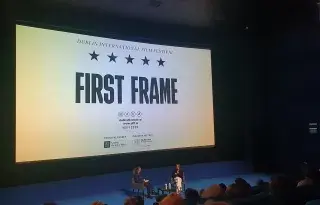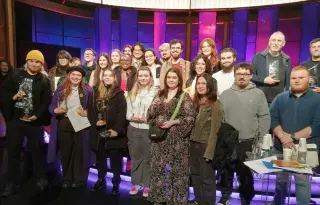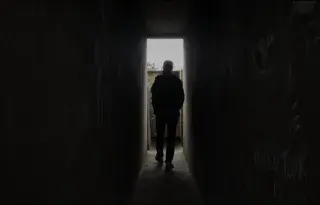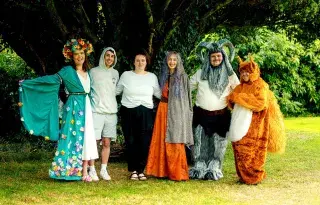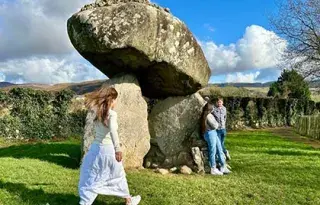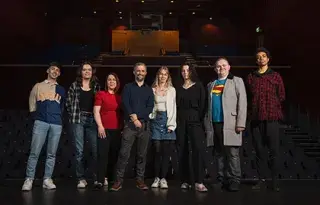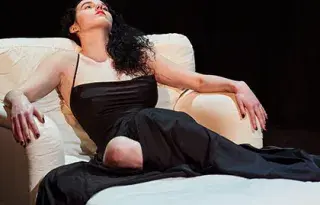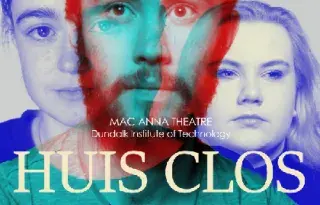BA in Drama, Theatre and Film
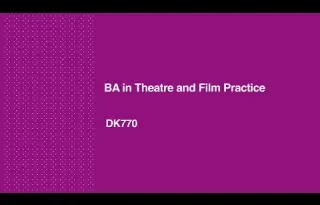
Search to find a different course
This course is subject to validation for September 2026.
Course Overview
This course is designed for students who aspire to work in the fields of drama, theatre, and film. It offers comprehensive training in performance, technical theatre, and film, preparing students to enter the industry as versatile and interdisciplinary practitioners. The structure of the course allows students the time and flexibility to explore their interests and develop their individual strengths.
Students will study a broad range of modules, including voice, acting, and movement; technical theatre—including set, sound, and lighting design, as well as stage management; film studies; film production; and post-production—resulting in a well-rounded and versatile skill set.
The course also includes a variety of theory modules, giving students the opportunity to deepen their understanding of theatre and film, and to become informed, reflective, and articulate voices within their practice.
What makes this course different
Meets Teaching Council Requirements
This programme meets Teaching Council requirements for the new Leaving Certificate in Drama, Film and Theatre Studies. Graduates will be eligible to progress to postgraduate studies in education.
Specialise Later
This course is ideally suited for students who want to work in areas of Drama, Theatre & Film but have not yet decided on which area to specialise.
Industry-Relevant Experience
This course is led by industry professionals and offers hands-on experience across theatre and film, giving students a realistic insight into multiple career paths they might persue.
Understanding the Industry
The theatre and film industry is a vibrant, fast-evolving field that brings together storytelling, performance, design, and technology. It spans a wide array of creative and technical roles—including actors, directors, writers, cinematographers, producers, and designers—who work collaboratively to create compelling experiences for stage and screen.
As audience expectations and platforms continue to shift, this dynamic industry values not only artistic talent but also adaptability, innovation, and an understanding of the broader cultural and production landscape.
Career Opportunities
This course prepares graduates to work as performers, makers, and technicians across the diverse landscape of theatre and film—whether in live, digital or recorded formats. With a strong foundation in both practical and theoretical aspects of production, students graduate with the skills, knowledge, and adaptability needed to thrive in Ireland's vibrant creative industries and beyond.
Graduates are equipped with core competencies that support a wide range of traditional and emerging career paths, including (but not limited to):
- Theatre and film technicians
- Set and costume and lighting designers
- Performers and creative artists
- Independent actors and devisers
- Scriptwriters and playwrights
- Arts administrators and producers
- Event managers and cultural promoters
- Digital content creators
- Dramaturgs
- Facilitators
- Theatre, Film and Drama teachers
Course Delivery and Modules
The course is delivered primarily through practical classes, complemented by lectures and tutorials in theatre and film theory.
The first year offers students a comprehensive introduction to core concepts in theatre, film, and performance. Learners explore foundational skills in voice, movement, acting, and devising. There is an emphasis on collaborative creativity and ensemble work. Academic writing and research skills are developed alongside practical introductions to both theatre and film studies. Students begin to understand the technical aspects of production and are introduced to theatrical forms. This year aims to establish confidence, versatility, and a broad base of skills for continued development.
Modules include:
- Creative Collaborative Development
- Freeing the Voice
- Introduction to Movement
- Principals of Devising
- Academic and Research Skills for Theatre
- Introduction to Film studies for stage and screen
- Vocal Skills
- Acting 1
- Intermediate Movement
- Introduction to Film Production 1
- Introduction to Musical/Theatre Studies
- Technical Theatre 1
In the second year, students build on foundational knowledge by engaging with more complex acting techniques and performance styles. They explore realism, applied devising practices, and engage with both classical and avant-garde theatre traditions. Technical theatre training continues with greater involvement in backstage and production roles through hands-on crew experience. Students also begin to engage with contemporary methods of content creation, expanding their toolkit for storytelling across stage and screen. Film production skills are developed further, and students are encouraged to think critically and creatively in a dedicated reflective space designed to foster innovation.
Modules include:
- Applied Devising
- Acting 2
- Realism in Theatre
- Technical Theatre 2
- Tech Crew 1
- Introduction to Film Production 2
- Acting 3
- Avant-Garde Theatre of the 20th Century
- Think Tank
- Tech Crew 2
- Content Creation
Year three marks a pivotal stage in the programme, with a strong emphasis on professional practice. The year culminates in a fully realised public production, staged in the on-site venue, The MacAnna Theatre. This hands-on experience simulates professional industry practice and allows students to take on significant creative and technical responsibilities in a live performance context.
Alongside the production work, students develop screen-acting skills, explore directing for theatre, and deepen their understanding of contemporary performance practice. Critical thinking is fostered through modules focused on performance analysis and current theatre discourse, including work exploring gender and representation. Continued involvement in reflective group spaces supports collaborative learning, peer feedback, and creative experimentation as students prepare for the demands of the professional world.
Modules include:
- Pre Production
- Women in Theatre
- Professional Practice
- Acting for Camera
- Tech Crew 3
- Production
- Contemporary Theatre and Practice
- Performance Analysis and Criticism
- Think Tank
- Theatre Directing
Education Progression
On completion of this course, students who obtain a GPA of 50 or above are eligible to be considered for entry to the BA (Hons) in Drama and Performance.
BA (Hons) in Drama and Performance
Fees and Funding
Please find information on fees and funding here: www.dkit.ie/fees
Entry requirements
In addition to the standard entry requirements below, English Grade 05 or H6. Applicants from NI/UK require a GCSE English Grade C or AS Level Grade D or A Level Grade E. There is no Mathematics entry requirement for this course.
- Standard Requirements for Leaving Certificate Applicants
- Standard Requirements for UK/NI Applicants
- Standard Requirements for QQI-Further Education Applicants
Recent CAO points
How to apply
Apply on CAO
All standard entry first-year applicants must apply for entry through the CAO. See Important application dates for CAO and information for specific applicant types below:
Advanced Entry & Transfer Applications
Advanced Entry is for applicants who have previous educational achievements and/or work experience and want to be considered for direct entry into year 2, 3, or 4 of a course. This includes students looking to transfer to DkIT from another Higher Education provider.
International Application (non-EU)
International Applicants (not from or living in the EU) can apply through an agent or directly to DkIT to study this course.
Ask us a Question
If you have a question about the BA in Drama, Theatre and Film please ask it below and we will get back to you.
Course News
View all NewsDisclaimer: All module titles are subject to change and for indicative purposes only. All courses are delivered subject to demand and timetables are subject to change. Elective Module options will only run subject to student numbers. The relevant Department will determine the viability of each elective module option proceeding depending on the number of students who choose that option. Students will be offered alternative elective modules on their programme should their preferred elective option not be proceeding. Award Options for Common Entry Programmes: The relevant Department will determine the viability of each award option proceeding depending on the number of students who choose either option. If the numbers for one of the Award options exceed available places, students for this option will be selected based on Academic Merit (highest grades).
